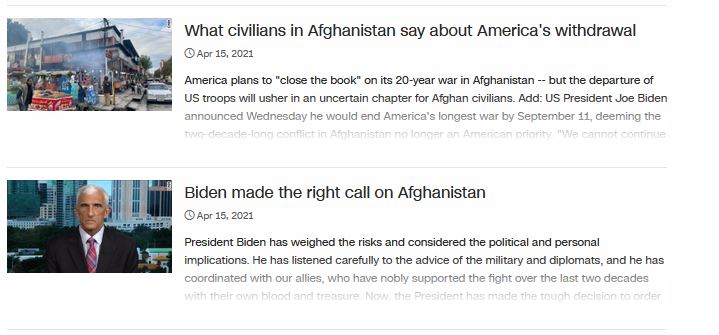
Both Biden & Trump announced Afghanistan troop withdrawals. Biden this week and Trump back in February 2020.
Is the media coverage of the two announcements similar or different?
If different, how and why?
[THREAD]

Is the media coverage of the two announcements similar or different?
If different, how and why?
[THREAD]


This thread is motivated by the thread from @DrewHolden360...
https://twitter.com/DrewHolden360/status/1382477293797400581
...and my flippant remark about that thread
https://twitter.com/ProfPaulPoast/status/1382665716688621573
As several folks pointed out (@dhnexon, @DenisonBe, @NGrossman81, @chadlevinson, & others), Holden's analysis was far from systematic. I fully agree. There have been a host of pieces highly critical of Biden, such as this @washingtonpost editorial board piece 

My remark wasn't to imply that Biden's foreign policy decisions receive only positive coverage. Far from it.
With a President's foreign policy decisions, one should expect a mix of praise & criticism from the media (though the balance varies)
annualreviews.org/doi/abs/10.114…
With a President's foreign policy decisions, one should expect a mix of praise & criticism from the media (though the balance varies)
annualreviews.org/doi/abs/10.114…
Instead, my remark referenced the idea that media coverage of Trump's decisions (especially on foreign policy) was negative, regardless of the decision.
washingtonpost.com/opinions/2021/…
washingtonpost.com/opinions/2021/…
So is the "Trump Derangement Syndrome" claim true?
One big difficulty is the idea of "holding all else constant". That's a tall order, as @ethanbdm pointed out
One big difficulty is the idea of "holding all else constant". That's a tall order, as @ethanbdm pointed out
https://twitter.com/ethanbdm/status/1382702923071770629
However, since both Biden and Trump announced a full troop withdrawal from Afghanistan, this offers a way to see if coverage of Trump did tend toward the negative.
Even then, one must be careful: Biden's announcement is not unrelated to Trump's.
nbcnews.com/think/opinion/…
Even then, one must be careful: Biden's announcement is not unrelated to Trump's.
nbcnews.com/think/opinion/…
Ideally, such an analysis would look across a wide swath of news sources, perhaps using something like @Factiva/@DowJones to find news articles around the time of both announcements
professional.dowjones.com/factiva/
professional.dowjones.com/factiva/
Then one would place all of this text into some sort of text analysis software or algorithm.
tidytextmining.com
tidytextmining.com

Or, better yet, have a team of research assistants to hand-code the "sentiment" of the text. As @RochelleTerman taught me, that's the gold standard...but it's resource (time &/or money) intensive. 

Unfortunately, I don't have time for that.
But let's consider something that is a bit more systematic than cherry picking stories.
But let's consider something that is a bit more systematic than cherry picking stories.
I decided to see how @CNN compared the two stories.
Is @CNN totally unbiased? No. But it's also not the most biased. The exact extent of bias is difficult to identify (see story 👇), but @MSNBC or @FoxNews would probably be worse choices.
poynter.org/fact-checking/…
Is @CNN totally unbiased? No. But it's also not the most biased. The exact extent of bias is difficult to identify (see story 👇), but @MSNBC or @FoxNews would probably be worse choices.
poynter.org/fact-checking/…
Also, @CNN has a pretty easy to use search engine.
So I started by doing a search for "Afghanistan, withdrawal"
So I started by doing a search for "Afghanistan, withdrawal"

As you might expect, lot's of articles over the past few days regarding Biden's announcement.
From April 13 (day before announcement) to April 15 (day after announcement), I counted 14 stories.
From April 13 (day before announcement) to April 15 (day after announcement), I counted 14 stories.

On balance, seems @CNN's coverage of Biden's announcement is...balanced.
What about when Trump announced a deal with the Taliban back in February 2020? The focus of Trump's remarks was bringing all US troops home.
Conducting the same search on @CNN, I went back to early March and late February 2020 (the announcement was on February 29, 2020). I found only 7 stories on the agreement.
So I expanded the search to "Trump, Taliban". Same 7 stories.
So I expanded the search to "Trump, Taliban". Same 7 stories.
On balance, seems @CNN's coverage of Trump's announcement tended towards negative.
Knowing that @CNN had a tendency to cover Trump negatively is one thing. But why? Pure "mainstream media" bias?
As @NGrossman81 aptly pointed out, the source is unclear
As @NGrossman81 aptly pointed out, the source is unclear
https://twitter.com/NGrossman81/status/1382700955486060559
One explanation could be the perception that Trump couldn't be making good decisions because he was inexperienced with foreign policy.
See @ProfSaunders's @IntOrgJournal piece for more on the importance of expertise.
cambridge.org/core/journals/…
See @ProfSaunders's @IntOrgJournal piece for more on the importance of expertise.
cambridge.org/core/journals/…
Another explanation is that since Trump was perceived as a "hawk" by the public -- which as @jessicalpweeks & @mattes_michaela point out in @AJPS_Editor, meant he would gain domestic praise for a peace deal -- the media needed to offer balance.
onlinelibrary.wiley.com/doi/abs/10.111…
onlinelibrary.wiley.com/doi/abs/10.111…
But that explanation is limited because the relationship between the media coverage, policy, and public views of the President is...complicated
oxfordhandbooks.com/view/10.1093/o…
oxfordhandbooks.com/view/10.1093/o…
So, based on this limited analysis, it does seem that Trump's announcement was more negatively covered than Biden's announcement.
Why that is, however, is not easy to parse out.
[END]
Why that is, however, is not easy to parse out.
[END]
• • •
Missing some Tweet in this thread? You can try to
force a refresh




























